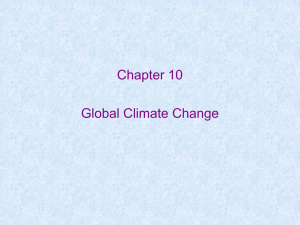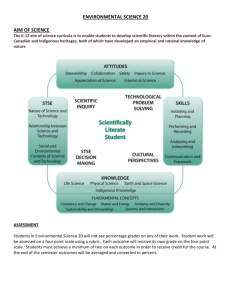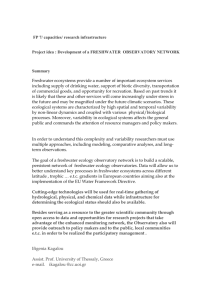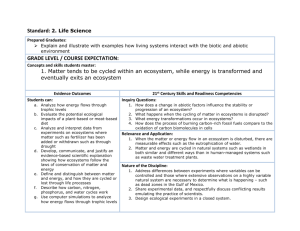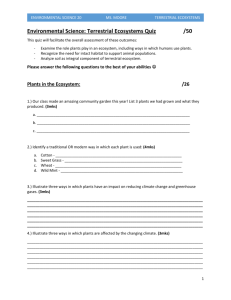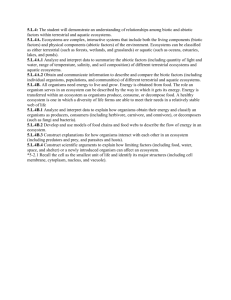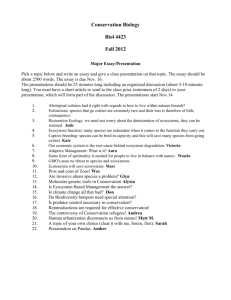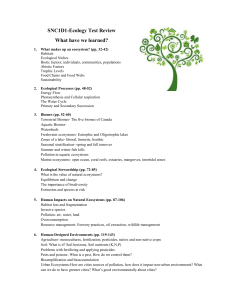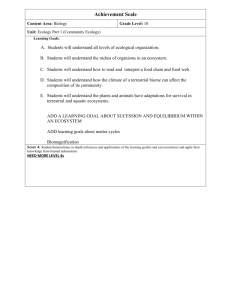Advancing joint roles as Coordinating Institutions for the Inter
advertisement
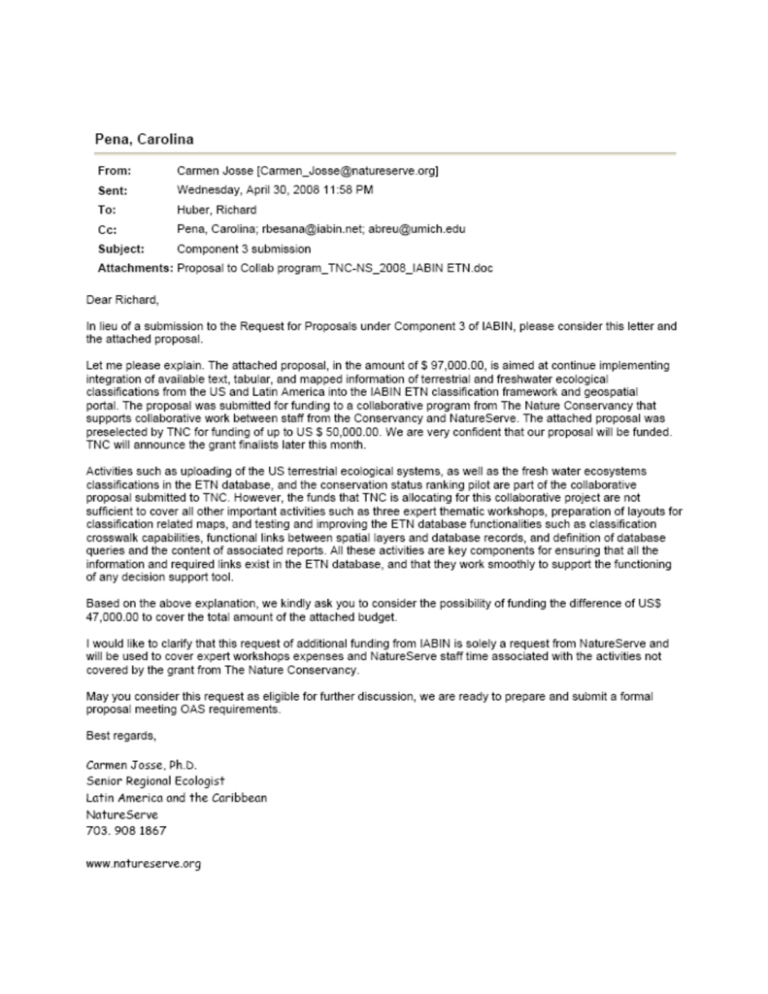
2008 NatureServe/Conservancy Proposals Title: Advancing joint roles as Coordinating Institutions for the Inter-American Biodiversity Information network (IABIN) – Ecosystems Thematic Network (ETN) Summary/Abstract The project goal is to catalyze collaboration and cooperative data development among ecosystem specialists throughout the Americas through the IABIN ETN. We propose to continue implementing integration of available text, tabular, and mapped information for NatureServe terrestrial ecological systems and TNC freshwater ecological classification from the US and Latin America respectively into the IABIN ETN classification framework and geospatial portal. Through this activity, we will also formalize joint coordination of the IABIN ETN between the Conservancy, NatureServe and the Smithsonian Tropical Research Institute - STRI (Panama). During the current GEF funded phase we will be able to implement and test our existing database structure to allow the automatic cross referencing of different terrestrial ecological classifications to the NatureServe Terrestrial Ecological Systems Classification for LAC. Building on this experience, our goal is to integrate the US terrestrial ecological classification and TNC freshwater classification, and secure funding to begin documenting conservation status (Global ranks, IUCN red list proposed criteria) for terrestrial ecological systems across the Americas. Benefits This effort has so far enabled new engagement of ecosystem specialists throughout Latin America to form a cohesive scientific community and advance common objectives. We are developing the first web portal for public access to mapped ecosystem data across political jurisdictions in Latin America (http://geospatial.iabin.net/), and a classification database containing comprehensive information for all of the terrestrial and freshwater ecosystems of the Americas. It should provide similar information services as the WWF Ecoregions related information resources have provided, but with higher spatial and thematic resolution, local variation and detail, and enhanced analytical tools. Use of these classification standards helps to clarify the ecological similarities among neighboring countries, stimulating more and better coordination on ecosystems conservation and management. The IABIN ETN database was developed based on the multi-level GEOSS ecosystem classification framework and that ensures the comprehensive mapping of the reference classification. As for organizational priorities this project addresses NatureServe’s objectives of supporting effective regional and landscape-scale conservation, as well as advancing standards and methods to assess ecosystems conservation status, and strengthening our role as a primary source for this information. As far as addressing Conservancy's goals, this work will help to establish the 2015 Goal baseline to track progress towards having 10% of all major habitat type under effective conservation by 2015. It will also help in the "roll up" of ecoregional assessment data across Mexico, Central America, and the Caribbean by means of providing a standard format reference classification. Approach This project will serve two purposes. It will require close coordination between the two organizations in developing datasets, methodology, and analytical tools, and it will allow the two organizations to jointly develop proposals for long term funding, and in doing so, promote a long-term collaboration throughout the Americas. NatureServe has already advanced the development of the IABIN-ETN database for the LAC terrestrial ecosystems and the framework for the Marine classification. In this proposed project, NatureServe will develop the US terrestrial ecosystems database and will advise TNC in developing the Freshwater database. Together we will propose new methods to assign conservation status ranking (e.g., as IUCN red list criteria for ecosystem types), and develop analytical tools to query and access that information. Both organizations will share the responsibility of coordination with STRI, and for developing and submitting the proposal for the long term coordination of the IABIN ETN and the implementation of web served ecosystems information. Products and Timelines 1. Coordination agreement and workplan for collaborative science and program development among TNC, NatureServe, and STRI 2. Criteria, categories and their definitions, including the classification structure for development of Terrestrial (US) and Freshwater (Americas) Standard Formats and database. One experts workshop for each. End of 6th month. 3. First progress report. End of 6th month. 4. Integration of existing spatial datasets (maps) with applied classifications. Implementation of a functional user interface. End of 8th month. First project milestone. 5. New Terrestrial and freshwater classification datasets entered in standard format database. End of 8th month. Second project milestone. 6. Pilot documenting conservation status (Global ranks, IUCN red list proposed criteria) for a selected set of terrestrial ecological systems. One experts workshop. End of 8th month. 7. Test of classifications crosswalk functionality of database and definition of types of queries and content of outputs of such queries. End of 9th month. 8. Evaluation of the pilot conservation status documentation and analytical tools. End of 10th month. 9. Second progress report including lessons learned and recommended next steps. End of 10th month. 10. Collaborative proposal sent to potential donors. The proposal goal will be to build on experience gained in making available terrestrial and freshwater ecosystems information, maps, conservation documentation, and developing new query and analytical tools for ecosystem based conservation and management decision making. The goal will be to cover 2-3 years of Network coordination with the new funding. End of 12th month. Third project milestone. Budget Detail This grant would provide essential support to make sure that we implement an ecosystems network database and geoportal that provides the basis for an ecosystem based decision support tool, it also will help establish our relative roles as a coordinating body and facilitate collaborative fundraising for ongoing effort. We anticipate that the IABIN-ETN will continue to grow and strengthen as an enduring institutional network. Cost I. II. III. IV. V. Personnel Costs Other Direct Costs (includes travel) Subagreements Indirect Cost @ 36.4% TOTAL COST $ $ $ $ $ 57,942.00 28,909.68 10,523.12 97,374.80 Required Positions US Terrestrial Ecologists: with comprehensive knowledge of the composition, structure, environmental settings, dynamics, and distribution of terrestrial ecological systems from a given region of the US and adjacent LAC. LAC Terrestrial Ecologist: with comprehensive knowledge of the composition, structure, environmental settings, dynamics, and distribution of terrestrial ecological systems of LAC. Freshwater Ecologist: with a deep familiarity with environmental settings, aquatic dynamics, and distribution of freshwater ecological systems from a given region of LAC. Database specialist (spatial and tabular): with knowledge of the tabular database design and GIS data management. The existing system includes a series of country-based geospatial data servers. Fundraising Ideas Initial funding to establish the ETN was provided from a GEF grant. There are currently a number of GEF funded grants to participating country ecologists for ongoing development of the first phase ETN efforts and for other Components of IABIN, which we will tap into. The technical and institutional infrastructure in development through the IABIN ETN facilitates collaborative fundraising on the part of international NGOs and host country governments throughout Latin America, the Caribbean, and the US. With stepped-up multi-jurisdictional collaboration in support of ecosystem assessment, planning, management, and monitoring, this network will be increasingly attractive to public and private donors. Communication: We will continue engagement with the ecosystem specialists contacted from throughout Latin America. The communications will also target the collaborators gained through the development of the US terrestrial ecosystems and the freshwater ecosystems classification. At the phase of development of the IABIN ETN database, we consider them as the main users and testers of this endeavor. Points of Contact NatureServe: Carmen Josse (Carmen_josse@natureserve.org) The Nature Conservancy: Maarten Kappelle (mkapelle@tnc.org)
